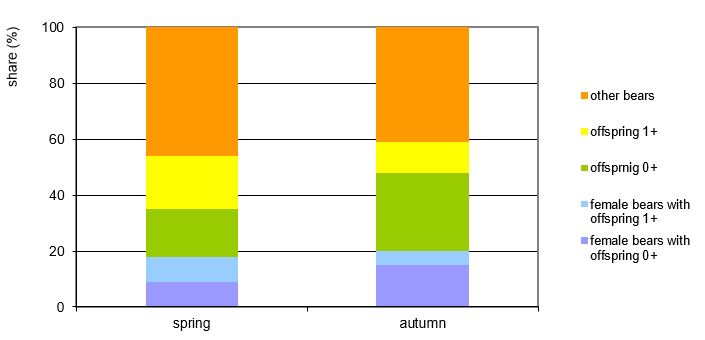[NB06] Brown bear

Key message

The population of brown bear (Ursus arctos) in Slovenia forms part of the larger population in the Alps – the Dinaric Alps (Dinarides) and the Pindus Mountains. It is one of the largest populations of brown bear in Europe. The number of bears in this population is estimated at 2,100–2,500. The state of the population in Slovenia has been monitored by the Slovenia Forest Service since 1995 and is deemed to be favourable. Brown bears live in large forested areas; in Slovenia, they are present in fir and beech forests of the high karst massifs, so the brown bear population indicator indirectly reflects the status of this forest landscape, which is largely included in the Natura 2000 network.
Charts
Statistical data on incidents caused by the brown bear to human assets, Slovenia Forest Service, 2015, Environmental Agency of the Republic of Slovenia, 2015
| 1995 | 1996 | 1997 | 1998 | 1999 | 2000 | 2001 | 2002 | 2003 | 2004 | ||
|---|---|---|---|---|---|---|---|---|---|---|---|
| incidents | number | 57 | 45 | 81 | 105 | 138 | 139 | 123 | 503 | 239 | 466 |
| damage in EUR | EUR | 11795 | 25621 | 40580 | 120653 | 99825 | 52638 | 44240 | 131377 | 64922 | 124129 |
| 2005 | 2006 | 2007 | 2008 | 2009 | 2010 | 2011 | 2012 | 2013 | 2014 | ||
| incidents | number | 817 | 589 | 294 | 625 | 380 | 629 | 311 | 592 | 364 | 519 |
| damage in EUR | EUR | 194866 | 145160 | 81866 | 171353 | 154314 | 252497 | 113703 | 232339 | 145066 | 192206 |
| 2015 | |||||||||||
| incidents | number | 339 | |||||||||
| damage in EUR | EUR | 143321 |
Statistical data on structure of elimination from the brown bear population, Slovenia Forest Service, 2015.
| 1995 | 1996 | 1997 | 1998 | 1999 | 2000 | 2001 | 2002 | 2003 | 2004 | ||
|---|---|---|---|---|---|---|---|---|---|---|---|
| males | number | 23 | 31 | 23 | 38 | 36 | 38 | 34 | 73 | 45 | 49 |
| females | number | 12 | 17 | 20 | 20 | 19 | 25 | 20 | 42 | 26 | 29 |
| unknown | number | 1 | 1 | 0 | 3 | 1 | 0 | 2 | 1 | 1 | 2 |
| males | % | 63.9 | 63.3 | 53.5 | 62.3 | 64.3 | 60.3 | 60.7 | 62.9 | 62.5 | 61.3 |
| females | % | 33.3 | 34.7 | 46.5 | 32.8 | 33.9 | 39.7 | 35.7 | 36.2 | 36.1 | 36.3 |
| unknown | % | 2.8 | 2 | 0 | 4.9 | 1.8 | 0 | 3.6 | 0.9 | 1.4 | 2.5 |
| up to 100 kg | number | 17 | 29 | 28 | 32 | 37 | 41 | 33 | 86 | 53 | 52 |
| from 101 to 150 kg | number | 12 | 15 | 13 | 20 | 7 | 16 | 14 | 20 | 13 | 17 |
| above 150 kg | number | 6 | 5 | 2 | 8 | 11 | 6 | 7 | 9 | 6 | 9 |
| unknown | number | 1 | np | np | 1 | 1 | np | 2 | 1 | np | 2 |
| total | number | 36 | 49 | 43 | 61 | 56 | 63 | 56 | 116 | 72 | 80 |
| 2005 | 2006 | 2007 | 2008 | 2009 | 2010 | 2011 | 2012 | 2013 | 2014 | ||
| males | number | 50 | 64 | 59 | 51 | 54 | 60 | 31 | 75 | 27 | 71 |
| females | number | 45 | 60 | 48 | 38 | 29 | 48 | 29 | 54 | 26 | 71 |
| unknown | number | 0 | 2 | 1 | 3 | 2 | 0 | 4 | 3 | 5 | 1 |
| males | % | 52.6 | 50.8 | 54.6 | 55.4 | 63.5 | 55.6 | 48.4 | 56.8 | 46.6 | 49.7 |
| females | % | 47.4 | 47.6 | 44.4 | 41.3 | 34.1 | 44.4 | 45.3 | 40.9 | 44.8 | 49.7 |
| unknown | % | 0 | 1.6 | 0.9 | 3.3 | 2.4 | 0 | 6.3 | 2.3 | 8.6 | 0.6 |
| up to 100 kg | number | 69 | 81 | 72 | 65 | 55 | 74 | 44 | 101 | 43 | 99 |
| from 101 to 150 kg | number | 22 | 31 | 21 | 21 | 19 | 26 | 13 | 21 | 9 | 24 |
| above 150 kg | number | 4 | 13 | 15 | 5 | 10 | 8 | 7 | 10 | 6 | 18 |
| unknown | number | np | np | np | 1 | 1 | np | 0 | 0 | 0 | 2 |
| total | number | 95 | 125 | 108 | 92 | 85 | 108 | 64 | 132 | 58 | 143 |
| 2015 | |||||||||||
| males | number | 71 | |||||||||
| females | number | 45 | |||||||||
| unknown | number | 0 | |||||||||
| males | % | 61.2 | |||||||||
| females | % | 38.8 | |||||||||
| unknown | % | 0 | |||||||||
| up to 100 kg | number | 80 | |||||||||
| from 101 to 150 kg | number | 23 | |||||||||
| above 150 kg | number | 13 | |||||||||
| unknown | number | 0 | |||||||||
| total | number | 116 |
Statistical data on the structure of elimination from the brown bear population, Slovenia Forest Service, 2015.
| 1995 | 1996 | 1997 | 1998 | 1999 | 2000 | 2001 | 2002 | 2003 | 2004 | ||
|---|---|---|---|---|---|---|---|---|---|---|---|
| Regular kills | number | 30 | 34 | 25 | 42 | 36 | 37 | 33 | 65 | 46 | 46 |
| Extraordinary kills | number | 2 | 9 | 7 | 8 | 6 | 8 | 8 | 25 | 15 | 14 |
| Capture | number | 2 | 1 | 2 | 3 | 2 | 3 | ||||
| Losses | number | 4 | 4 | 10 | 11 | 12 | 15 | 13 | 23 | 11 | 20 |
| Kills - total | number | 32 | 43 | 32 | 50 | 42 | 45 | 41 | 90 | 61 | 60 |
| Eliminated bears - total | number | 36 | 49 | 43 | 61 | 56 | 63 | 56 | 116 | 72 | 80 |
| 2005 | 2006 | 2007 | 2008 | 2009 | 2010 | 2011 | 2012 | 2013 | 2014 | ||
| Regular kills | number | 36 | 76 | 68 | 61 | 56 | 93 | 51 | 85 | 44 | 109 |
| Extraordinary kills | number | 37 | 18 | 21 | 14 | 13 | 5 | 6 | 15 | 4 | 11 |
| Capture | number | 5 | |||||||||
| Losses | number | 22 | 27 | 19 | 17 | 16 | 10 | 7 | 32 | 10 | 23 |
| Kills - total | number | 73 | 94 | 89 | 75 | 69 | 98 | 57 | 100 | 48 | 120 |
| Eliminated bears - total | number | 95 | 126 | 108 | 92 | 85 | 108 | 64 | 132 | 58 | 143 |
| 2015 | |||||||||||
| Regular kills | number | 93 | |||||||||
| Extraordinary kills | number | 6 | |||||||||
| Capture | number | ||||||||||
| Losses | number | 17 | |||||||||
| Kills - total | number | 99 | |||||||||
| Eliminated bears - total | number | 116 |
Statistical data on the monitoring of abundance trends and the population structure of the brown bear, Slovenia Forest Service and Slovenian Hunting Association, 2015.
| spring | autumn | ||
|---|---|---|---|
| female bears with offspring 0+ | % | 9 | 15 |
| female bears with offspring 1+ | % | 9 | 5 |
| offsprnig 0+ | % | 17 | 28 |
| offspring 1+ | % | 19 | 11 |
| other bears | % | 46 | 41 |
Statistical data on the monitoring of abundance trends and the population structure of the brown bear, Slovenia Forest Service and Slovenian Hunting Association, 2015.
| 2004 | 2005 | 2006 | 2007 | 2008 | 2009 | 2010 | 2011 | 2012 | 2013 | ||
|---|---|---|---|---|---|---|---|---|---|---|---|
| spring | number | 0.8 | 1.15 | 0.95 | 0.46 | 1.22 | 0.82 | 1.23 | 0.51 | 1.17 | 1.02 |
| total | number | 0.84 | 1.16 | 1.03 | 0.71 | 1.09 | 0.95 | 1.09 | 0.76 | 1.13 | 1.06 |
| 2014 | 2015 | ||||||||||
| spring | number | 1.49 | 1.14 | ||||||||
| total | number | 1.42 | 1.2 |
Goals
The objective, as determined by the Resolution on National Environmental Action Plan 2005-2012, is to maintain a favourable state of the brown bear population and to decrease conflicts.













